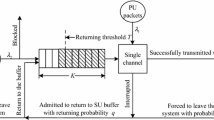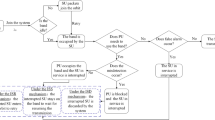Abstract
In cognitive radio networks (CRNs), unpredictable communication interruptions increase data communication delay of secondary users. The QoS of CRNs will dramatically decrease when interruptions are nested. In this paper, we propose a general multiple priority cognitive radio networks (MP-CRNs) model for both single-channel and multi-channel communications. In our MP-CRNs, SUs are divided into multiple categories of different priorities; users with higher priority preemptively interrupt lower ones; interruptions can be nested and all interrupted tasks are resumable. By introducing some extra concepts and terminologies, we first define and model the nested interrupts, we then derive and prove the formulas of nested interrupts. We also validate these formulas through mathematical experiments. Using Queuing Theory, we design a Mutual Minimizing Algorithm to minimize average nested interrupts. We also propose a novel Turnaround Time Control Algorithm to minimize SU’s turnaround time when considering nested interrupts. Simulations and experiments demonstrate the efficiency and effectiveness of the proposed algorithms.
Access this chapter
Tax calculation will be finalised at checkout
Purchases are for personal use only
Preview
Unable to display preview. Download preview PDF.
Similar content being viewed by others
References
Mitola, J., Maguire, G.Q.: Cognitive radio:making software radios more personal. IEEE Personal Communications 6(4), 13–18 (1999)
Haykin, S.: Cognitive radio: brain-empowered wireless communications. IEEE Journal on Selected Areas in Communications 23(2), 201–220 (2005)
Akyildiz, I.F., Lee, W., Vuran, M., Mohanty, S.: Next generation/dynamic spectrum access/cognitive radio wireless networks: A survey. Computer Networks 50(13), 2127–2159 (2006)
Tachwali, Y., Lo, B.F., Akyildiz, I.F., Agusti, R.: Multiuser resource allocation optimization using bandwidth-power product in cognitive radio networks. IEEE Journal on Selected Areas in Communications 31(3), 451–463 (2013)
Takine, T., Sengupta, B.: A single server queue with service interruptions. Queueing Systems 26(3-4), 285–300 (1997)
Lee, D.S.: Analysis of a single server queue with semi-markovian service interruption. Queueing Systems 27(1-2), 153–178 (1997)
Núñez Queija, R.: Sojourn times in a processor sharing queue with service interruptions. Queueing Systems 34(1-4), 351–386 (2000)
Pang, G.D., Whitt, W.: Heavy-traffic limits for many-server queues with service interruptions. Queueing Systems 61(2-3), 167–202 (2009)
Chou, C.T., Sai Shankar, N., Kim, H.: What and how much to gain by spectral agility? IEEE Journal on Selected Areas in Communications 25(3), 576–588 (2007)
Gozupek, D., Buhari, S., Alagoz, F.: A spectrum switching delay-aware scheduling algorithm for centralized cognitive radio networks. IEEE Transactions on Mobile Computing 12(7), 1270–1280 (2013)
Wang, L.C., Wang, C.W., Chang, C.J.: Modeling and analysis for spectrum handoffs in cognitive radio networks. IEEE Transactions on Mobile Computing 11(9), 1499–1513 (2012)
Pan, M., Yue, H., Zhang, C., Fang, Y.G.: Path selection under budget constraints in multihop cognitive radio networkss. IEEE Transactions on Mobile Computing 12(6), 1133–1145 (2013)
Irwin, R.E., MacKenzie, A.B., DaSilva, L.A.: Resource-minimized channel assignment for multi-transceiver cognitive radio networkss. IEEE Journal on Selected Areas in Communications 31(3), 442–450 (2013)
Zhou, X.W., Li, G.Y., Sun, G.L.: Multiuser spectral precoding for ofdm-based cognitive radio systems. IEEE Journal on Selected Areas in Communications 31(3), 345–352 (2013)
Wang, S.W., Zhou, Z.H., Ge, M.Y., Wang, C.G.: Resource allocation for heterogeneous cognitive radio networks with imperfect spectrum sensing. IEEE Journal on Selected Areas in Communications 31(3), 464–475 (2013)
Li, H.S., Han, Z.: Socially optimal queuing control in cognitive radio networks subject to service interruptions: To queue or not to queue? IEEE Transactions on Wireless Communications 10(5), 1656–1666 (2011)
Gunawardena, S., Zhuang, W.H.: Service response time of elastic data traffic in cognitive radio networks. IEEE Journal on Selected Areas in Communications 31(3), 559–570 (2013)
Author information
Authors and Affiliations
Editor information
Editors and Affiliations
Rights and permissions
Copyright information
© 2013 Springer-Verlag Berlin Heidelberg
About this paper
Cite this paper
Zhu, P., Ling, T., Wei, G., Ying, B. (2013). Minimizing Nested Interrupts of Secondary Users in Multi-Priority Cognitive Radio Networks. In: Pathan, M., Wei, G., Fortino, G. (eds) Internet and Distributed Computing Systems. IDCS 2013. Lecture Notes in Computer Science, vol 8223. Springer, Berlin, Heidelberg. https://doi.org/10.1007/978-3-642-41428-2_2
Download citation
DOI: https://doi.org/10.1007/978-3-642-41428-2_2
Publisher Name: Springer, Berlin, Heidelberg
Print ISBN: 978-3-642-41427-5
Online ISBN: 978-3-642-41428-2
eBook Packages: Computer ScienceComputer Science (R0)




